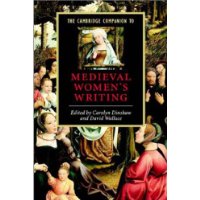| 商家名称 |
信用等级 |
购买信息 |
订购本书 |
|
|
 |
The Cambridge Companion to Medieval Women's Writing |
 |
|
 |
The Cambridge Companion to Medieval Women's Writing |
 |

基本信息·出版社:Cambridge University Press
·页码:316 页
·出版日期:2003年06月
·ISBN:0521796385
·条形码:9780521796385
·装帧:平装
·丛书名:Cambridge Companions to Literature
·外文书名:剑桥文学指南: 中世纪的女性作品
内容简介 在线阅读本书
This Companion seeks to recover the lives and particular experiences of medieval women by concentrating on the texts they wrote as well as texts that attempted to shape their lives. Contributors consider the lives and writings of remarkable women, including Marie de France, Heloise, and Joan of Arc among others.
作者简介 Carolyn Dinshaw is Professor of English and Director of the Centre for the Study of Gender and Sexuality at New York University. She is the author of Chaucer's Sexual Poetics (1989), and Getting Medieval: Sexualities and Communities, Pre- and Postmodern (1999).
编辑推荐 Review 'While The Cambridge Companion to Medieval Women's Writing comprehensiveness makes it valuable as an introduction to the field, individual articles such as Summit's, as well as Christopher Cannon's argument in 'enclosure' for anchoritic life and literature as 'crucial arenas in which the modern self was first defined and mapped' will also recommend this volume as are source for advanced scholars.' Arthuriana 'Dinshaw and Wallace are to be congratulated for achieving excellent coverage of the subject, and for producing a volume which more than meets the high standards set by others in this series.' Women's History Magazine '... a significant overview of women's writing during the Middle Ages ...'. Sixteenth Century Journal 'Readers with an interest in medieval women's writing will find plenty of stimulating and original material in this new companion.' Anglia '... the volume offers an impressive range of essays representing a variety of methodologies and perspectives. ... the volume makes an equal worthy read from beginning to end ...' Envoi
Review ‘While The Cambridge Companion to Medieval Women's Writing comprehensiveness makes it valuable as an introduction to the field, individual articles such as Summit’s, as well as Christopher Cannon’s argument in ‘enclosure’ for anchoritic life and literature as ‘crucial arenas in which the modern self was first defined and mapped’ will also recommend this volume as are source for advanced scholars.’ Arthuriana
‘Dinshaw and Wallace are to be congratulated for achieving excellent coverage of the subject, and for producing a volume which more than meets the high standards set by others in this series.’ Women’s History Magazine
‘… a significant overview of women‘s writing during the Middle Ages …‘. Sixteenth Century Journal
'Readers with an interest in medieval women's writing will find plenty of stimulating and original material in this new companion.' Anglia
'… the volume offers an impressive range of essays representing a variety of methodologies and perspectives. … the volume makes an equal worthy read from beginning to end …' Envoi
Product Description The Cambridge Companion to Medieval Women’s Writing seeks to recover the lives and particular experiences of medieval women by concentrating on various kinds of texts: the texts they wrote themselves as well as texts that attempted to shape, limit, or expand their lives. The first section investigates the roles traditionally assigned to medieval women (as virgins, widows, and wives); it also considers female childhood and relations between women. The second section explores social spaces, including textuality itself: for every surviving medieval manuscript bespeaks collaborative effort. It considers women as authors, as anchoresses ‘dead to the world’, and as preachers and teachers in the world staking claims to authority without entering a pulpit. The final section considers the lives and writings of remarkable women, including Marie de France, Heloise, Joan of Arc, Julian of Norwich, Margery Kempe, and female lyricists and romancers whose names are lost, but whose texts survive.




